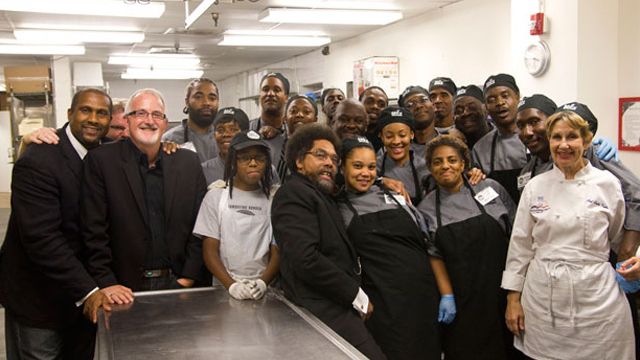We’re proud to collaborate with The Nation in sharing insightful journalism related to income inequality in America. The following is an excerpt from Nation contributor Greg Kaufmann’s “This Week in Poverty” column.

Next Thursday, at George Washington University in the nation’s capital — just four days before President Obama’s inauguration — broadcaster Tavis Smiley will bring together a bipartisan panel and an array of poverty experts in a nationally televised event, “Vision for A New America: A Future Without Poverty.”
Expect a heated debate, as a panel that includes Newt Gingrich, Cornel West and Michael Moore discusses Smiley’s call for a national plan to cut poverty in half in ten years and to eradicate it in twenty-five.
It’s part of Smiley’s latest effort to bring attention to the more than 46 million Americans living below the poverty line, on less than $18,000 annually for a family of three. Smiley is also calling on the president to deliver a major public policy address on poverty — which includes telling the American people what they can do to help — and to convene a White House Conference on the Eradication of Poverty.
“This is all about raising the profile of poverty in America,” Smiley told me. “It’s about gaining traction.”
While the aforementioned headliners will help fill the auditorium next week — along with Jeffrey Sachs, Jonathan Kozol, Congressional Black Caucus Chair Marcia Fudge, and National Nurses United executive director Rose Ann DeMoro — there are a couple of less widely-known panelists that I am definitely looking forward to hearing from as well.
If you read this blog, you know Dr. Mariana Chilton, director for the Center for Hunger-Free Communities, founder of Witnesses to Hunger and associate professor of Drexel University School of Public Health.
Chilton is one of the brightest, most creative people I’ve come across in an antipoverty field that is full of great thinkers and activists. Also, more than anyone I know, she touts the fact that the “real experts” on poverty are the people who are actually living in poverty — and Witnesses to Hunger is a testament to that belief. You can bet if Gingrich starts pushing stereotypes about poverty and hunger, Chilton will counter with facts, science and the collaborative work she does with low-income citizens every day.
John Graham, dean of the Indiana University School of Public and Environmental Affairs, will be there too. He’s the co-author of America’s Poor and the Great Recession, which will be released later this month. Graham served in the Office of Management and Budget under the Bush administration, and Smiley said his new book — for which Smiley wrote the foreword — “lays out specific policy proposals [to fight poverty] that Graham believes both the left and right can agree on.”
Perhaps the key moment in the symposium for me, however, will be when Smiley speaks directly with low-income people in the audience.
Smiley will ask them to talk about “what they’ve gone through in this country and this economy;” a program that they are involved with and why it works; and what the country can learn from their experiences. As I’ve said before — and I know Smiley agrees — the people who know poverty firsthand are the ones we need to listen to if we want to know what they are experiencing, shatter the myths and stereotypes and learn more about the most effective pathways out of poverty.
Smiley hopes viewers and audience members will be motivated to sign his petition calling for the White House conference, and that the panel is a preview of “what that conference might look like — when you get folks in the room who don’t agree.”
While he’s under no illusion that a presidential address and a conference will suddenly translate into a national commitment to the eradication of poverty, he does believe that it would spark further conversation, debate and movement on the issue, and I think he’s right about that. An example of how this kind of approach can lead to sustained action: in his 1995 State of the Union address, President Clinton called for a National Campaign to Prevent Teen Pregnancy. Clinton’s staff then convened a non-partisan meeting to mobilize a wide range of sectors and set a bold goal to reduce the U.S. teen pregnancy rate by one-third in ten years. Sixteen years later, through diverse efforts, the nation has exceeded that goal and teen pregnancy is at an all-time low.
Smiley has an ambitious timeline for the conference and policy speech he envisions — he wants it to happen prior to the debt ceiling debate.
“This is a way to make sure we don’t have another debate that’s exclusive for Washington insiders like we did with the cliff debate in January,” said Smiley. “It’s a way to expand the conversation, to bring in our fellow citizens.”
I will definitely be in the audience next Thursday night and I hope you will be there, too. If you can’t attend in person, you can watch live on C-SPAN or online here.
Kudos to Mr. Smiley for his continued focus — through books, TV, radio and tours — on people who are usually demonized or completely ignored in our politics and media.

